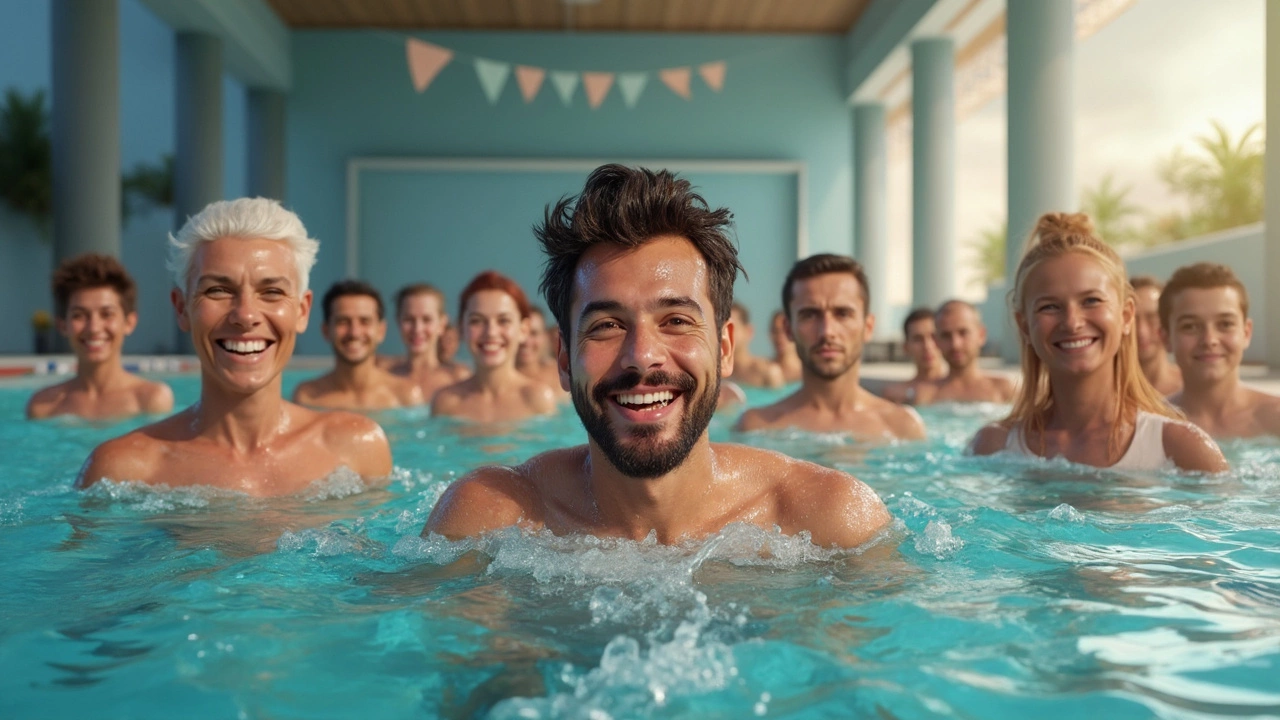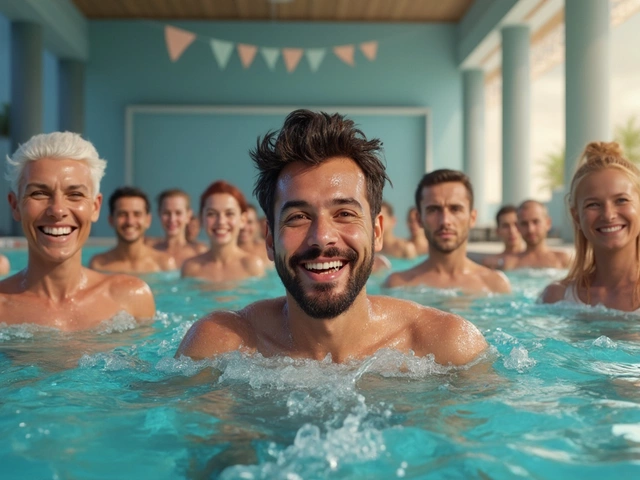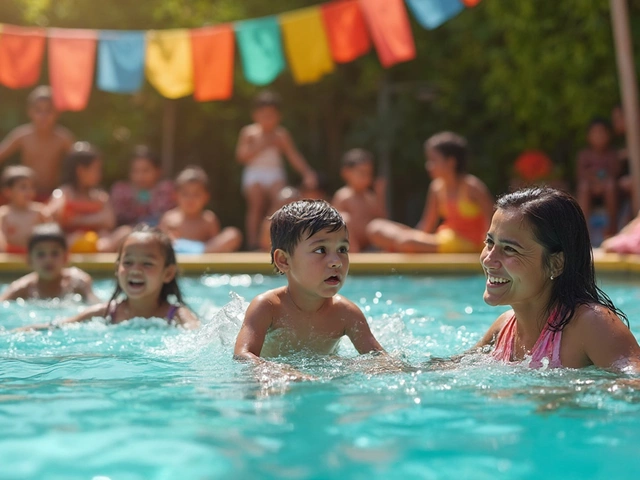So, you're hitting the big 4-0 and thinking about taking the plunge into swimming? You might wonder if it's too late. Spoiler: it's not. Swimming isn’t just for kids splashing around in the shallow end. People are discovering it’s never too late to get started.
You wouldn't believe how many folks start swimming later in life and totally love it. Sure, we might creak a little more than a teenager, but adult swim lessons are a blast and tailored just for us. They focus on comfort and confidence first, so no worries if you feel like a fish out of water initially.
The benefits? Oh boy, where to start. Swimming's an awesome exercise that’s easy on your joints. It helps build strength and endurance. Ever heard of water's magical powers to soothe your mind? Swimming is like meditation, only with a splash. Plus, imagine the thrill of finally conquering those lengths.
- Breaking the Age Myth
- Benefits of Swimming Later in Life
- Overcoming Challenges
- Practical Tips for Beginners
Breaking the Age Myth
Think swimming is just for the young? Think again! The notion that you can't learn swimming at 40 is outdated. Plenty of people start swimming at various stages of adulthood, and many have found it incredibly rewarding. Our muscles and joints can still adapt and improve. You're never too old to get started.
Why do many believe otherwise? It's largely because of old biases and misinformation. But science has shown us repeatedly that our bodies can continue to learn and grow throughout our lives. According to studies, adults can quickly pick up swimming skills, and older athletes often maintain performance levels comparable to younger swimmers.
Here’s a little-known fact: Masters swimming programs are booming across the globe, and they cater specifically to adult beginners and veterans. These programs emphasize skill improvement in a supportive environment, making it easier for adults to overcome fears and gain confidence in the water.
Worried about progress? Most adult swimmers report significant improvements in mere weeks of consistent practice. It’s about finding the right environment and instructions. Swimming is one of those sports where age can even bring about an advantage—like patience and understanding of technique that younger swimmers might lack.
Stop letting age make the rules for you. Dive into adult swimming lessons and embrace the joy of learning something new. Whether it’s for fitness, leisure, or just to do something different, it’s high time to break free from those age myths.
Benefits of Swimming Later in Life
You might think that at 40, your prime fitness days are behind you. But swimming's here to prove you wrong. It's like discovering a hidden superpower.
For starters, swimming is an incredible way to get fit without putting stress on your joints. It’s a low-impact workout, which means your knees and hips won’t protest as you glide through the water.
Swimming also ramps up your cardiovascular health. Regular laps in the pool can make your heart stronger and improve your endurance. Ever noticed how many swimmers have long lungs? That’s because their lung capacity increases, helping them breathe easier in everyday life.
Mentally, swimming works wonders, too. The rhythm of your strokes and the calmness of the water can really give your brain a break from the hustle and bustle. It’s known to reduce anxiety and even improve mood, thanks to those lovely endorphins you get from workouts.
Need more convincing? Here’s a little chart breaking down some sweet benefits:
| Benefit | Impact |
|---|---|
| Low Impact | Reduces joint stress |
| Cardio Health | Strengthens heart |
| Mental Wellness | Reduces stress |
And if you think you'd be left in the dust because you're learning at 40, think again! Adult swimming lessons are tailored to help you catch up quickly. They focus on technique and personal safety, making sure you become a confident swimmer, no matter how many candles are on your birthday cake.
So, don’t let age stop you from diving into something new. The pool is calling, and it’s ready to welcome you with open arms.

Overcoming Challenges
Diving into swimming at 40 isn't without its bumps in the water, but hey, challenges are part of the fun, right? It's normal to feel nervous about looking clueless when you're learning something totally new. Adult swimming lessons are crafted to ease these fears.
First up, confidence. Many adults worry about this, but trust me, everyone in class is on the same page. Instructors know how to make you feel comfortable and tackle it step by step. It's not a race! They focus on basic skills, like floating and breathing, before moving to strokes.
Physical hurdles? Sure, they exist. Your body might take a little longer to adjust. That's where patience kicks in. And you're not alone— swimming at 40 is common, so instructors are pros at helping us oldies ease in. Plus, swimming's low-impact nature supports your knees and back as you build stamina.
- Get the right gear: A well-fitting swimsuit, goggles, and a swim cap are must-haves. They make a big difference in comfort and confidence.
- Set small goals: Tackle one objective at a time, like improving your breathing or swimming half a lap. Little wins are huge motivators.
- Find your flow: Don't rush. Take breaks and listen to your body. This isn't a sprint, and there's no shame in taking things slow.
Feeling awkward? Yep, been there. But every swimmer started somewhere. Remember to laugh off the hiccups. With persistence, you'll be gliding through the water before you know it. Get out there and prove that learning to swim at 40 can be just as rewarding as starting at any age.
Practical Tips for Beginners
Alright, if you've decided to tackle swimming lessons at 40, hats off to you! But let's make sure you're setting yourself up for success. Diving headfirst without some prep? Not the best idea. Here's what you need to know.
First thing's first—get the right gear. You don’t need top-notch equipment, just a snugly fitting swimsuit, goggles that don’t leak, and maybe a swim cap if you’re not a fan of wet hair. Trust me, being comfortable is half the battle.
Next, pick the right class. Look for swim classes that are specifically for adults. These classes recognize that adults process things differently than kids and adjust accordingly. You’ll get personalized tips and support, which is especially helpful when you're just starting.
- Start Slow: It’s okay if, at first, your swimming resembles flailing more than floating. Focus on basic strokes and getting comfortable breathing in the water. Patience, my friend!
- Find Your Rhythm: Don't worry about keeping up with others. Everyone’s at different levels. Concentrate on your progress and build up gradually from day to day.
- Stay Relaxed: Tension is your enemy in swimming. Practice floating and gentle kicking exercises to get used to the water. Once you let go of the stiffness, swimming becomes smoother and more enjoyable.
- Set Achievable Goals: Goal-setting keeps you motivated. Start with small milestones like swimming one length of the pool or mastering a single stroke. Celebrate these wins!
- Seek Feedback: Don't hesitate to ask your instructor for tips. A little clarity or adjustment can go a long way.
Still not sure? Here’s a cool fact: according to the American Red Cross, 54% of Americans either can't swim or don't have all of the basic swimming skills. So you're in great company, figuring it out in real-time!
Remember, learning to swim at 40 isn’t a race. It’s about enjoying the process and soaking up every moment. Literally!



